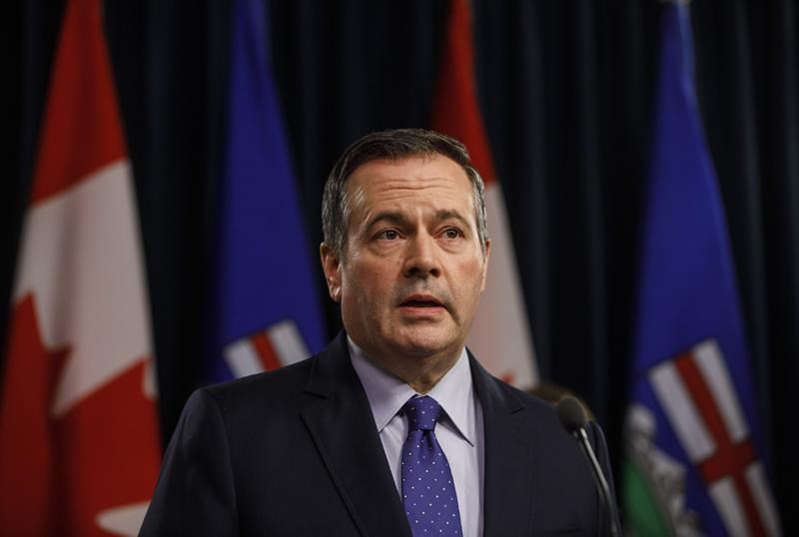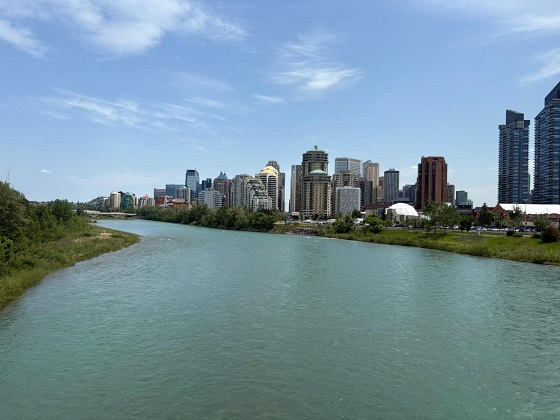Alberta
Alberta justice minister hikes fines, promises renewed effort on COVID-19 scofflaws

EDMONTON — Alberta has doubled fines for disobeying public health measures meant to fight COVID-19 and Justice Minister Kaycee Madu is promising a renewed effort to stop public health scofflaws will succeed.
“Enforcement will be done, and Albertans will see it being done,” Madu told a news conference Wednesday.
“It has become clear that there are a small few who refuse to comply with reasonable and legitimate public health orders”
The United Conservative government passed an order in council Wednesday that doubles fines for public health violations to $2,000.
Madu said there is also a new protocol for health officials, police and government to co-ordinate and target repeat individuals and groups that flout the law.
He said he discussed with police chiefs this week what further tools and resources they need to step up enforcement.
Premier Jason Kenney on Tuesday announced stronger measures to reverse soaring COVID-19 cases that threaten to overwhelm hospitals by month’s end and to force doctors to decide which patients get life-saving care.
Kenney’s government has been criticized for being a paper tiger on lawbreakers. In January, it allowed some restaurants to flout dine-in restrictions. GraceLife church, in Spruce Grove, Alta., west of Edmonton, was able to hold Sunday services for months that officials have said ignored rules on masks, capacity limits and physical distancing. Police physically blocked off the church just a month ago.
The enforcement issue made headlines again on this weekend when hundreds of people gathered near Bowden in central Alberta for a pre-advertised maskless “No More Lockdowns” protest rodeo.
Edmonton and Calgary have also seen maskless mass protests against health restrictions.
Action was taken Wednesday against one accused repeat offender. Alberta Health Services announced the Whistle Stop Café in Mirror, Alta., had been physically closed and access barred. The café had been flagged for repeatedly breaking COVID-19 health restrictions by staying open and serving customers.
Opposition NDP Leader Rachel Notley said Kenney’s government set its enforcement policy up for failure from the get-go by stressing education first and enforcement as a last resort.
Referring to the protocol Madu outlined, Notley said: “The fact there is a protocol to tell them to talk to each other is not new. It is a policy dressed up to look like action, but it is not significant, and that’s why we’re calling on them to do more.”
She criticized the plan to target only repeat offenders: “(That) says to me their plan is to give everybody their first rodeo free, which is in effect what they did with the Bowden rodeo.
“This has to stop because that Bowden rodeo will turn out to be a super-spreader. People will get sick from that rodeo. People will get seriously ill.”
Kenney announced tighter rules Tuesday, some of which came in effect Wednesday. Outdoor gatherings, which had been limited to 10 people, are now capped at five. Worship services, which were allowed at 15 per cent capacity, have been reduced to 15 people maximum.
Retailers, which had been open at 15 per cent customer capacity, are restricted to 10 per cent.
On Friday, all kindergarten to Grade 12 students will learn from home. On Sunday, restaurants must close their patios and offer takeout service only. Personal wellness services, including hair salons and barber shops, will have to close.
Indoor social gatherings remain banned. Entertainment venues, including movie theatres and casinos, also remain closed.
As of Wednesday, Alberta had 24,156 active cases of COVID-19, with 666 people in hospital. It has experienced the highest infection rates in North America in recent weeks.
There are almost 1.7 million Albertans who have received at least one dose of vaccine. About one in three adults have had a shot.
Kenney said the vaccination rollout will be expanded drastically, with everyone in the province 12 and older to soon be eligible.
Every Albertan born in 1991 or earlier will be able to book vaccinations starting Friday. On Monday, appointments will be offered to anyone born between 2009 and 1992.
Earlier Wednesday, Health Canada approved the Pfizer-BioNTech vaccine for children as young as 12.
This report by The Canadian Press was first published May 5, 2021.
Dean Bennett, The Canadian Press
Alberta
Alberta Next Panel calls to reform how Canada works

From the Fraser Institute
By Tegan Hill
The Alberta Next Panel, tasked with advising the Smith government on how the province can better protect its interests and defend its economy, has officially released its report. Two of its key recommendations—to hold a referendum on Alberta leaving the Canada Pension Plan, and to create a commission to review programs like equalization—could lead to meaningful changes to Canada’s system of fiscal federalism (i.e. the financial relationship between Ottawa and the provinces).
The panel stemmed from a growing sense of unfairness in Alberta. From 2007 to 2022, Albertans’ net contribution to federal finances (total federal taxes paid by Albertans minus federal money spent or transferred to Albertans) was $244.6 billion—more than five times the net contribution from British Columbians or Ontarians (the only other two net contributors). This money from Albertans helps keep taxes lower and fund government services in other provinces. Yet Ottawa continues to impose federal regulations, which disproportionately and negatively impact Alberta’s energy industry.
Albertans were growing tired of this unbalanced relationship. According to a poll by the Angus Reid Institute, nearly half of Albertans believe they get a “raw deal”—that is, they give more than they get—being part of Canada. The Alberta Next Panel survey found that 59 per cent of Albertans believe the federal transfer and equalization system is unfair to Alberta. And a ThinkHQ survey found that more than seven in 10 Albertans feel that federal policies over the past several years hurt their quality of life.
As part of an effort to increase provincial autonomy, amid these frustrations, the panel recommends the Alberta government hold a referendum on leaving the Canada Pension Plan (CPP) and establishing its own provincial pension plan.
Albertans typically have higher average incomes and a younger population than the rest of the country, which means they could pay a lower contribution rate under a provincial pension plan while receiving the same level of benefits as the CPP. (These demographic and economic factors are also why Albertans currently make such a large net contribution to the CPP).
The savings from paying a lower contribution rate could result in materially higher income during retirement for Albertans if they’re invested in a private account. One report found that if a typical Albertan invested the savings from paying a lower contribution rate to a provincial pension plan, they could benefit from $189,773 (pre-tax) in additional retirement income.
Clearly, Albertans could see a financial benefit from leaving the CPP, but there are many factors to consider. The government plans to present a detailed report including how the funds would be managed, contribution rates, and implementation plan prior to a referendum.
Then there’s equalization—a program fraught with flaws. The goal of equalization is to ensure provinces can provide reasonably comparable public services at reasonably comparable tax rates. Ottawa collects taxes from Canadians across the country and then redistributes that money to “have not” provinces. In 2026/27, equalization payments is expected to total $27.2 billion with all provinces except Alberta, British Columbia and Saskatchewan receiving payments.
Reasonable people can disagree on whether or not they support the principle of the program, but again, it has major flaws that just don’t make sense. Consider the fixed growth rate rule, which mandates that total equalization payments grow each year even when the income differences between recipient and non-recipient provinces narrows. That means Albertans continue paying for a growing program, even when such growth isn’t required to meet the program’s stated objective. The panel recommends that Alberta take a leading role in working with other provinces and the federal government to reform equalization and set up a new Canada Fiscal Commission to review fiscal federalism more broadly.
The Alberta Next Panel is calling for changes to fiscal federalism. Reforms to equalization are clearly needed—and it’s worth exploring the potential of an Alberta pension plan. Indeed, both of these changes could deliver benefits.
Alberta
Alberta’s new diagnostic policy appears to meet standard for Canada Health Act compliance

From the Fraser Institute
By Nadeem Esmail, Mackenzie Moir and Lauren Asaad
In October, Alberta’s provincial government announced forthcoming legislative changes that will allow patients to pay out-of-pocket for any diagnostic test they want, and without a physician referral. The policy, according to the Smith government, is designed to help improve the availability of preventative care and increase testing capacity by attracting additional private sector investment in diagnostic technology and facilities.
Unsurprisingly, the policy has attracted Ottawa’s attention, with discussions now taking place around the details of the proposed changes and whether this proposal is deemed to be in line with the Canada Health Act (CHA) and the federal government’s interpretations. A determination that it is not, will have both political consequences by being labeled “non-compliant” and financial consequences for the province through reductions to its Canada Health Transfer (CHT) in coming years.
This raises an interesting question: While the ultimate decision rests with Ottawa, does the Smith government’s new policy comply with the literal text of the CHA and the revised rules released in written federal interpretations?
According to the CHA, when a patient pays out of pocket for a medically necessary and insured physician or hospital (including diagnostic procedures) service, the federal health minister shall reduce the CHT on a dollar-for-dollar basis matching the amount charged to patients. In 2018, Ottawa introduced the Diagnostic Services Policy (DSP), which clarified that the insured status of a diagnostic service does not change when it’s offered inside a private clinic as opposed to a hospital. As a result, any levying of patient charges for medically necessary diagnostic tests are considered a violation of the CHA.
Ottawa has been no slouch in wielding this new policy, deducting some $76.5 million from transfers to seven provinces in 2023 and another $72.4 million in 2024. Deductions for Alberta, based on Health Canada’s estimates of patient charges, totaled some $34 million over those two years.
Alberta has been paid back some of those dollars under the new Reimbursement Program introduced in 2018, which created a pathway for provinces to be paid back some or all of the transfers previously withheld on a dollar-for-dollar basis by Ottawa for CHA infractions. The Reimbursement Program requires provinces to resolve the circumstances which led to patient charges for medically necessary services, including filing a Reimbursement Action Plan for doing so developed in concert with Health Canada. In total, Alberta was reimbursed $20.5 million after Health Canada determined the provincial government had “successfully” implemented elements of its approved plan.
Perhaps in response to the risk of further deductions, or taking a lesson from the Reimbursement Action Plan accepted by Health Canada, the province has gone out of its way to make clear that these new privately funded scans will be self-referred, that any patient paying for tests privately will be reimbursed if that test reveals a serious or life-threatening condition, and that physician referred tests will continue to be provided within the public system and be given priority in both public and private facilities.
Indeed, the provincial government has stated they do not expect to lose additional federal health care transfers under this new policy, based on their success in arguing back previous deductions.
This is where language matters: Health Canada in their latest CHA annual report specifically states the “medical necessity” of any diagnostic test is “determined when a patient receives a referral or requisition from a medical practitioner.” According to the logic of Ottawa’s own stated policy, an unreferred test should, in theory, be no longer considered one that is medically necessary or needs to be insured and thus could be paid for privately.
It would appear then that allowing private purchase of services not referred by physicians does pass the written standard for CHA compliance, including compliance with the latest federal interpretation for diagnostic services.
But of course, there is no actual certainty here. The federal government of the day maintains sole and final authority for interpretation of the CHA and is free to revise and adjust interpretations at any time it sees fit in response to provincial health policy innovations. So while the letter of the CHA appears to have been met, there is still a very real possibility that Alberta will be found to have violated the Act and its interpretations regardless.
In the end, no one really knows with any certainty if a policy change will be deemed by Ottawa to run afoul of the CHA. On the one hand, the provincial government seems to have set the rules around private purchase deliberately and narrowly to avoid a clear violation of federal requirements as they are currently written. On the other hand, Health Canada’s attention has been aroused and they are now “engaging” with officials from Alberta to “better understand” the new policy, leaving open the possibility that the rules of the game may change once again. And even then, a decision that the policy is permissible today is not permanent and can be reversed by the federal government tomorrow if its interpretive whims shift again.
The sad reality of the provincial-federal health-care relationship in Canada is that it has no fixed rules. Indeed, it may be pointless to ask whether a policy will be CHA compliant before Ottawa decides whether or not it is. But it can be said, at least for now, that the Smith government’s new privately paid diagnostic testing policy appears to have met the currently written standard for CHA compliance.

Lauren Asaad
Policy Analyst, Fraser Institute
-

 Uncategorized1 day ago
Uncategorized1 day agoMortgaging Canada’s energy future — the hidden costs of the Carney-Smith pipeline deal
-

 Business2 days ago
Business2 days agoThere’s No Bias at CBC News, You Say? Well, OK…
-

 International1 day ago
International1 day agoAustralian PM booed at Bondi vigil as crowd screams “shame!”
-

 Opinion2 days ago
Opinion2 days agoReligion on trial: what could happen if Canada passes its new hate speech legislation
-

 Automotive19 hours ago
Automotive19 hours agoCanada’s EV gamble is starting to backfire
-

 Agriculture16 hours ago
Agriculture16 hours agoEnd Supply Management—For the Sake of Canadian Consumers
-

 Alberta15 hours ago
Alberta15 hours agoAlberta Next Panel calls to reform how Canada works
-

 Environment13 hours ago
Environment13 hours agoCanada’s river water quality strong overall although some localized issues persist












